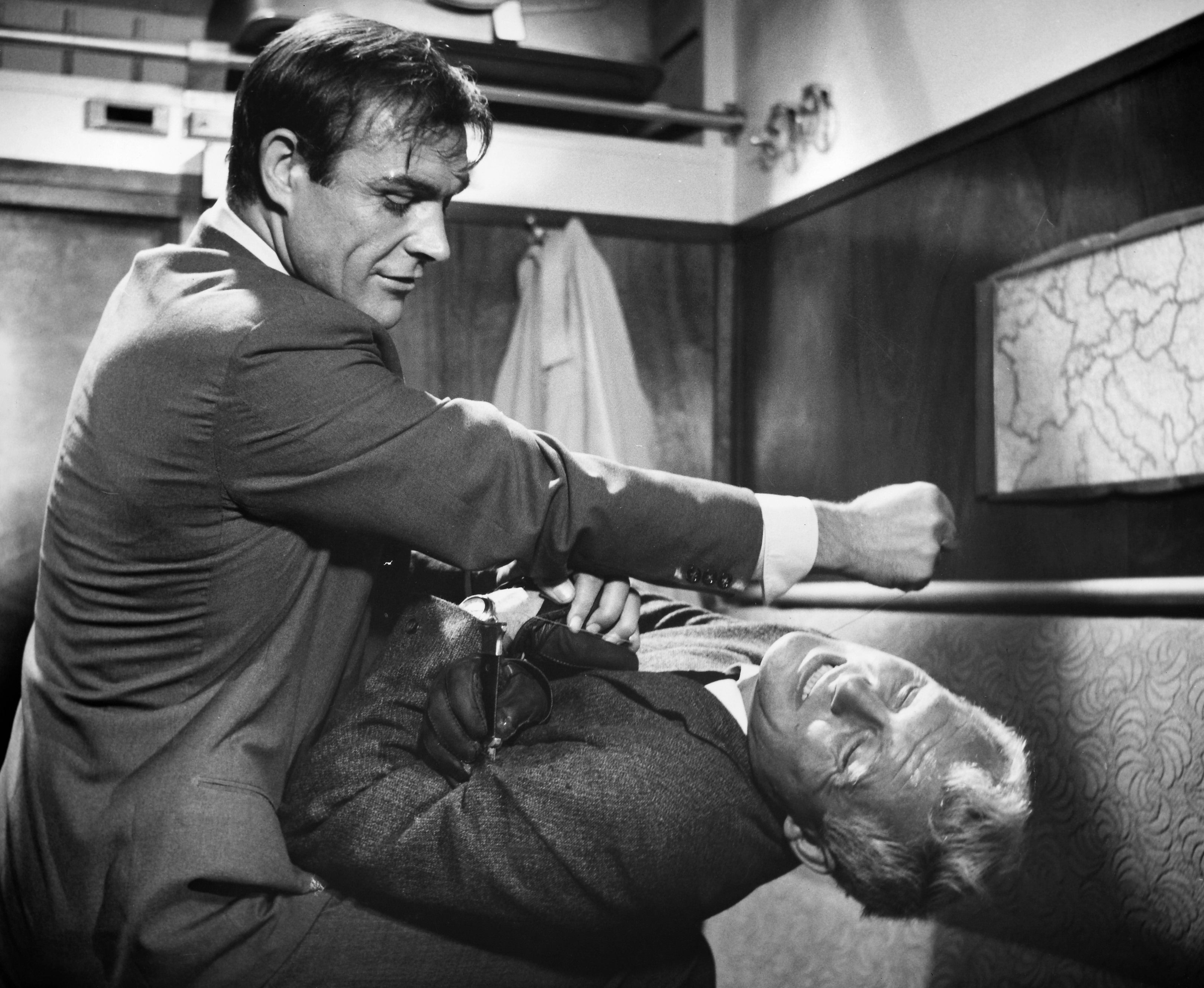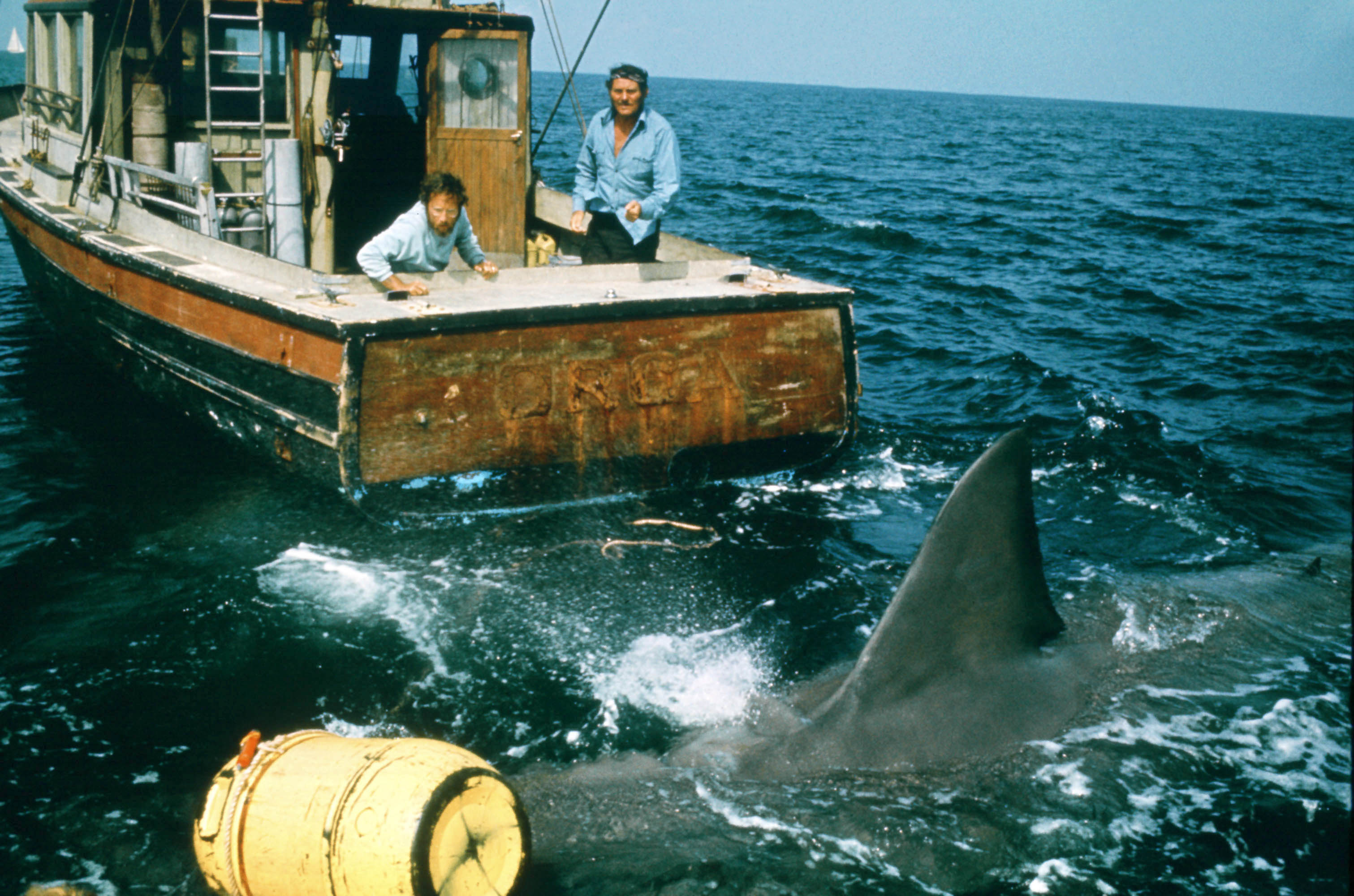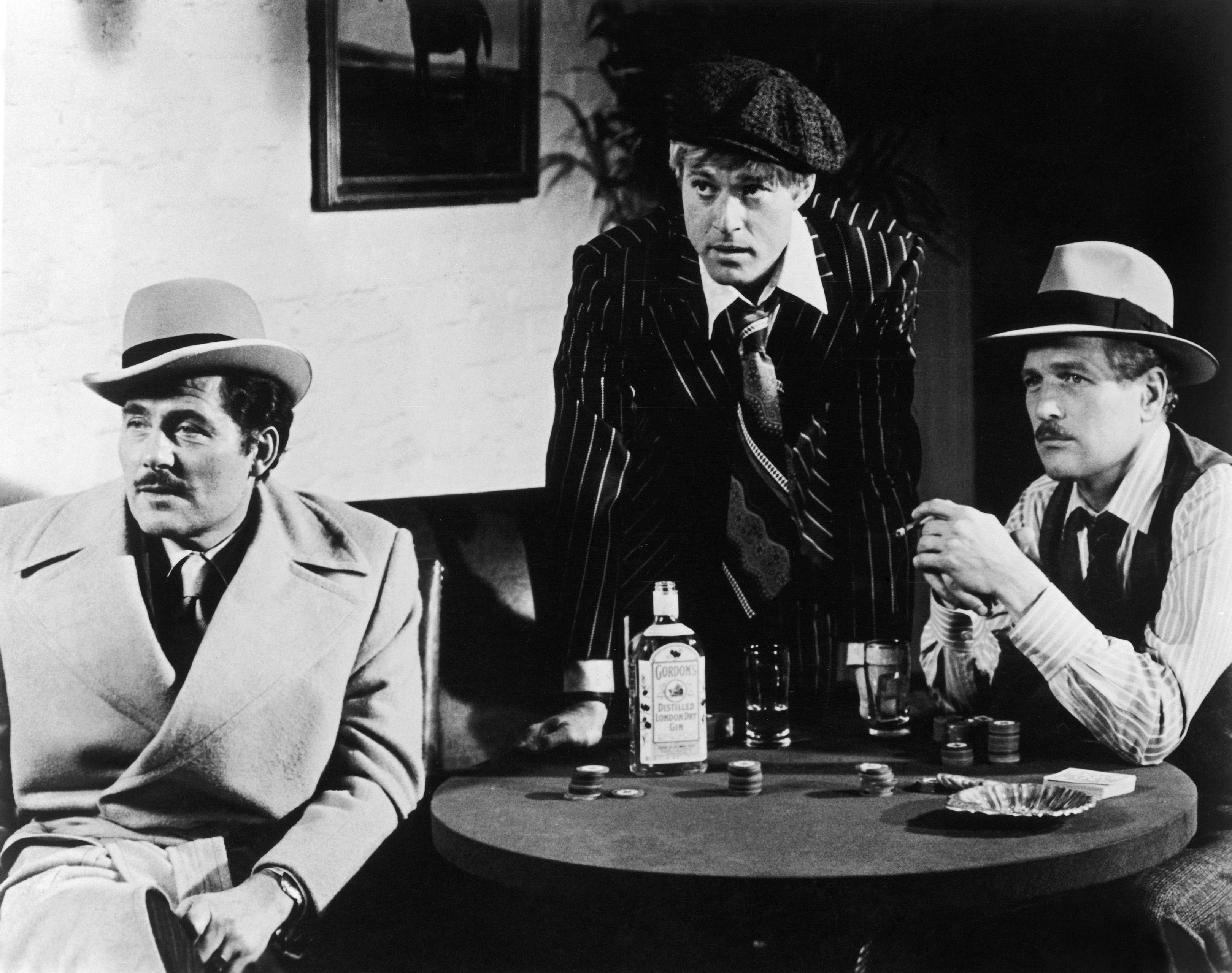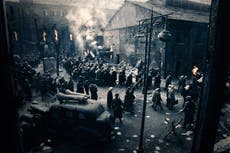From Bond baddie to shark hunter: Robert Shaw’s killer roles
With the re-release of ‘From Russia with Love’ this week, as part of the 60th-anniversary celebrations of 007, Geoffrey Macnab looks back at the varied screen career of Shaw, who is best known for playing the ruthless assassin in the Sean Connery film, as well as the shark-obsessed fisherman Quint in ‘Jaws’

Don’t mess with Donald “Red” Grant – played by Robert Shaw. That’s the message at the start of the second Sean Connery Bond film From Russia with Love, which is being re-released in cinemas this week, as part of the 60th-anniversary celebrations of James Bond on screen. Connery’s 007 looks utterly terrified by the hulking, blond-haired killer, dressed all in black. They’re stalking each other in the dead of night in the gardens of a country house. Shaw unwinds a garrotting wire conveniently kept inside his watch, creeps behind the British spy, and chokes him to death. The entire procedure takes less than two minutes.
Only when a colleague puts his fingers under the dead man’s chin and peels back a mask do we realise that this isn’t the real Bond, just a fake. The point, though, is made forcefully enough. Shaw’s Grant is a ruthless, cold-blooded assassin. He is nothing like those other Bond villains with their gadgets, pet cats, and steel-rimmed hats.
Later in the movie, in a famous scene aboard a train, Grant pretends to be a British spy. Bond is almost taken in until the imposter orders Chianti with his grilled sole. Red wine with fish! By the expression on his face, it’s clear that Bond is deeply shocked. No self-respecting English gentleman (or spy) would commit such an offence against culinary good taste.
When Bond and Grant are about to fight to the death, Bond can’t help but remind his antagonist of his appalling wine selection. “You may know the right wines but you’re the one on your knees,” the professional Spectre assassin sneers back at him. Shaw delivers the lines with sadistic malice as if he really does get a kick out of seeing Bond humiliated. It’s a measure of Shaw’s screen presence that he steals the scene from under Connery’s nose.
Shaw performed an even more impressive feat of cinematic larceny in Steven Spielberg’s Jaws (1975), playing the sea captain Quint. With his gruff charisma, he not only prised viewers’ attention away from co-stars Richard Dreyfuss and Roy Scheider but diverted their thoughts away from the great white shark too.
For many, the most chilling moment in the entire movie is Shaw’s monologue about the sinking of the USS Indianapolis during the Second World War. “Eleven hundred men were in the water. The vessel went down in 12 minutes…” he mutters with an incongruous grin, as he proceeds to describe himself bobbing in the sea, as sharks gnawed away at and killed roughly 800 of his colleagues. “You hear that terrible high-pitch screamin’ and the ocean turns red and spite of all the poundin’ and the hollerin’ they all come in and rip you to pieces…”
Shaw re-wrote some of the lines to give them an extra chill. “If anyone could give the shark some trouble, it would be Shaw… Robert has a threatening quality that is unique on screen,” observed Carl Gottlieb, co-writer of the Jaws screenplay in his book, The Jaws Log.
The actor’s son Ian Shaw, who recently portrayed his father in the Jaws-themed hit playThe Shark is Broken, tells me about his father’s performances “you don’t know exactly what he is going to do next”. He adds: “He has got an extraordinary energy and he feels dangerous a lot of the time.” Ian suggests that the “merciless” bullying Shaw experienced as a child when his father was a doctor in Orkney “toughened him up and gave him quite a thick skin. It gave him a lot of his character … he was unflinching and fearless and faced his demons.”
Ian also speculates that Shaw’s strong identification with “the underdog and the outsider” had its roots in those childhood experiences.
Shaw died aged only 51 in 1978. He was a literary novelist, playwright, and Shakespearian actor, as well as a movie star. He often gave the impression that he was appearing on the big screen only under sufferance.
The English actor had heavy financial commitments which required him to keep on working.
“I think the movies were because he had to pay the school fees mostly. He would have liked to be writing books but he had eight, nine children – ten children in the end – and the school fees were huge,” the actor’s widow Virginia Shaw told filmmaker Brian Reddin, who made a 2015 documentary about him.
Shaw took on some of his later Hollywood assignments –The Deep, Avalanche Express, Black Sunday – for the pay cheques, rather than the artistic challenge. He drank heavily and could be irascible on set.
“My feeling is that after Jaws, which was so successful, the roles he took were disappointing,” Ian acknowledges. “I often wonder why he took them…I have a strong suspicion that when he was offered The Deep, he wasn’t doing that because of the script; he was doing that because he felt it would make money and he felt he needed to make money. The other films afterwards as well, like Force 10 from Navarone and Avalanche Express – the films he should have made afterJaws should have been better than that, given that he was really at the top of the tree at that point, for a British actor.”
Nonetheless, you’ll struggle to find a bad Shaw performance. He is best remembered today for just a handful of roles – the Bond movie, his roaring Henry VIII in A Man for All Seasons (1966), his mobster in The Sting (1973), the Ahab-like sea dog in Jaws, and the ruthless hijacker of a New York subway train in The Taking of Pelham One Two Three (1974) – but his range was huge. Look through his credits and you’ll find westerns, comedies, war movies, costume dramas, and even Harold Pinter adaptations. He’ll be a Nazi officer in one film and a British squadron leader in another. He played both General Custer and the Sheriff of Nottingham.
It’s instructive to watch Shaw opposite Robert Redford and Paul Newman in The Sting. Shaw is cast as Doyle Lonnegan, a depression-era gangland boss. Newman and Redford are the grifters planning an outrageous swindle against him.

The first time Lonnegan appears on screen, we’re only shown the back of his head, but he is still an utterly intimidating figure. He’s at the gambling table. When one of his bodyguards tries to talk to him, he doesn’t even turn around to look at the man. Shaw plays the role with an Irish lilt in his voice and a pronounced limp. Producer Julia Phillips later claimed that he had slipped on a handball court in his hotel and then had to wear a brace for the entire film. His jerky way of walking makes him seem yet more threatening.
The slightest mishap or inconvenience – a racehorse that doesn’t come in, a hand of cards that goes against him – drives him into a murderous rage. In a way, he is like the shark. The terror felt by the con artists played by Redford and Newman as they try to harpoon him only adds to the tension. With a less saturnine actor in the role, the film would have seemed very bland.
Shaw is such an imposing actor that you assume he is physically huge. In fact, he wasn’t especially tall, at not quite 5ft 11in. Contemporaries talk about his truculence and ferociously competitive instincts. He always wanted to be the best at everything. Even Connery, never a gracious loser himself, found him difficult company on a golf course. Alongside Richard Harris, Albert Finney, and Stanley Baker, Shaw was one of a new generation of British actors who were more likely to scowl than smile and who brought a physical and psychological intensity to every role they played.
It’s intriguing to watch old interviews with Shaw, for example, a 1970 BBC Omnibus profile, Robert Shaw: The Actor as Novelist. He talks and behaves not like a movie star flogging a new project, but like a patient in the psychiatrist’s chair, ready to be utterly frank about the most intimate aspects of his life.
“My father, you see, was an alcoholic. He was a doctor and he had a great charm… an enormous charm. When sober, he was the most likeable man I knew in my life and when drunk, which was often, very troubled… life for us was a series of crises,” the actor recalls about his father who took his own life when Shaw was a boy.
Shaw drew on that darkness. Even in his most conventional screen roles, playing buccaneers, spivs, heroes, or villains, he had a brooding, introspective quality. He is chilling, for example, in Lance Comfort’s low-budget British thriller, Tomorrow at Ten (1962). This is one of a number of Shaw’s films in which class tension is foregrounded. He plays Marlow, a working-class crook who kidnaps the young son of a wealthy industrialist. There is a very telling scene in which he visits the industrialist (Alec Clunes) to demand a ransom. He is a menacing figure, deeply resentful about the wealth and luxury enjoyed by the pampered upper-class businessman he is trying to extort money from.

There was a similar class dynamic in both The Hireling (1973), in which he plays the chauffeur driving around a mentally fragile but very manipulative aristocrat (Sarah Miles), and in From Russia with Love, when he felt that Connery was looking down on him. Shaw was very effective at portraying men with crater-sized chips on their shoulders.
“As far as I remember he only does two things really well: shout above rain and wind and stand with his legs apart,” rival actor Dirk Bogarde once sniped about Shaw. Perhaps Bogarde was jealous. Shaw had a ferocity on screen that Bogarde conspicuously lacked. When he turned his gaze on an enemy, his stare was so piercing that his antagonists would shrink in his presence. Only the very bravest, or the most foolhardy, would dare tell Shaw that, no, you really shouldn’t drink Chianti with your dover sole. Outside the great white in Jaws, it’s hard to think of any screen adversary that ever got the better of him – and even then, it’s a fair assumption that he stuck in the shark’s gullet and gave the poor creature the acutest indigestion imaginable.
‘From Russia With Love’ is re-released in UK cinemas this week, followed by the entire Bond cycle, until 30 September as part of ‘Celebrating 60 Years of James Bond’ (www.007.com)
Join our commenting forum
Join thought-provoking conversations, follow other Independent readers and see their replies
Comments


Bookmark popover
Removed from bookmarks